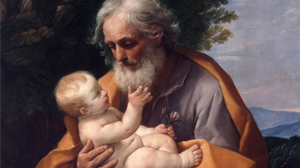Scripture:
Genesis 1:26-2:3
or Colossians 3:14-15, 17, 23-24
Matthew 13:54-58
Reflection:
This has to be one of the most beautiful feasts on the liturgical calendar. Coinciding with “May Day” where countries around the world celebrate the dignity of human work, this feast lifts up the example of Joseph the Worker. The gospel selection from Matthew 13:54-58 says it all, identifying Jesus as “the son of the carpenter.” The townspeople of Nazareth seem hostile to Jesus, their native son, and point to his humble roots as a countersign to the reputation Jesus had acquired as a wise teacher, a powerful prophet and healer. But the fact that Jesus was raised by a working man highlights the Word of God’s full embrace of our humanity and gives new dignity to human labor.
A further source of that dignity is proclaimed in the first reading for today’s feast, taken from the opening chapter of Genesis. We hear a portion of the magnificent account of creation, a reading we also heard at the Easter Vigil. After having created the abundant and teeming beauty of the earth and all its creatures, God now turns to the creation of the human being, “male and female.” While the account in Genesis 1 underscores the goodness of all that God created and, as such, becoming a reflection of the Divine presence, the creation of the human is on a different scale. “Let us make the human in our image, after our likeness.” Made in the divine image, the human is able to be “god-like” – able to choose and respond, able to reciprocate in an intentional way the love that God lavished on creation. Thus the human can enter into a relationship with God and will have a destiny of being united with God forever.
Important for this feast is the fact that God gives to men and women the responsibility of stewardship over the earth and its creatures. The human gives the animals their name and is called to till the earth and make it fruitful (Gen 2:15). The word Genesis uses is “to have dominion” over the earth. In some times past, people have understood this to mean that humans are free to exploit the earth and plunder it without concern for its care. But the word “dominion” here has a special connotation. The Bible attributed “dominion” to the power of the king, who was to act on behalf of God, protecting and nourishing the people, caring for the vulnerable and the poor. The king of Israel was chastised by God is he were to abuse or exploit God’s people.
Pope Francis has appealed to these very passages of the Genesis in making a case that responsibility for our earth and its well-being is a Christian responsibility given to us by God. He states that the environmental crisis we are experiencing is the most serious “moral crisis” of our time. Our labor is to help build up God’s kingdom, to ensure that the earth remains fruitful and life-giving, particularly for the poor who depend on the bounty of the earth for their daily nourishment. Thus all work—from the most humble of toil to the technological advanced work of science—is to be in service of humanity and the earth to which we all belong. The subtitle of the Pope’s remarkable instruction, Laudato Si’ (old Italian for “Praise you, Lord,” from a poem of St. Francis of Assisi), affirms this very point: “On Care for Our Common Home.”
On this day when we remember Joseph whose labor supported and nourished the very Son of God, let us honor human work of all kinds and re-dedicate ourselves to the responsibility of protecting and caring for our common home.
Fr. Donald Senior, C.P. is President Emeritus and Professor of New Testament at Catholic Theological Union. He lives at the Passionist residence in the Hyde Park neighborhood of Chicago.
